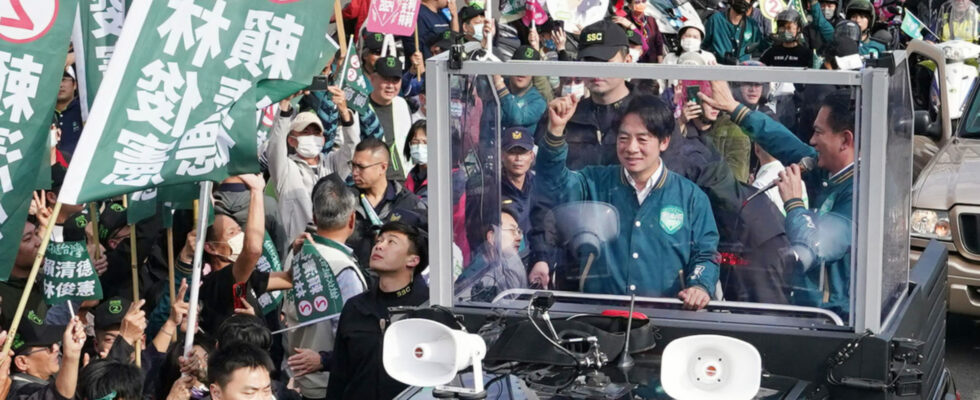China on Thursday called on Taiwan’s residents to make “the right choice” in Saturday’s presidential election, criticizing the favored candidate as “a grave danger” for his pro-independence positions. Outgoing Vice President Lai Ching-te, from the Democratic Progressive Party (DPP), is the favorite in this election closely followed by Beijing, which claims Taiwan as one of its provinces, and Washington, the main supporter and supplier of arms from the island.
Promotion of Taiwanese independence
The outcome of this one-round election will be crucial for the future of their relations and the United States has indicated that it will send an “informal delegation” to Taiwan after the vote. “If he (Lai Ching-te) comes to power, he will continue to promote separatist activities linked to Taiwan’s independence”, which is “a harmful path”, said a spokesperson for the Chinese office responsible for relations with the island, Chen Binhua.
He said he hoped that the people of Taiwan would make “the right choice” and judged that Lai Ching-te represented “a serious danger” for relations between China and Taiwan. “Frankly, Beijing should stop meddling in other countries’ elections and organize its own,” retorted Taiwanese Foreign Minister Joseph Wu on the social network
For several years, China has been increasing diplomatic and military pressure on Taiwan. And if she says she favors a “peaceful” reunification with the island, whose 23 million inhabitants are governed by a democratic system, she does not rule out the use of force if necessary.
“Reckless remarks”
The status of Taiwan is one of the most explosive subjects in the rivalry between China and the United States, the territory’s primary military supporter. The United States has also planned to send “an informal delegation” to Taiwan after the election, a senior American official said on Wednesday. “It would be provocative for Beijing to respond (to the election result) with more military pressure or coercive actions,” also warned the official, who requested anonymity.
This week four Chinese balloons crossed the median line separating the self-ruled island from China, according to the Taiwanese Defense Ministry, while 10 planes and four warships were detected. The American official added that Washington opposed any attempt at external “interference” in the island’s electoral process, a process in which the United States has “full confidence”.
Diplomatic war
The United States must “not interfere in the elections in the Taiwan region, in any form whatsoever, in order to avoid seriously harming Sino-American relations”, responded Thursday Mao Ning, a spokesperson for the Chinese Ministry of Foreign Affairs. “China is firmly opposed to any form of official exchanges between the United States and Taiwan,” she added, criticizing Washington’s “thoughtless comments” on the subject of the election.
Earlier this week, senior Chinese military officials told their American counterparts that China would “never compromise” on Taiwan and urged the United States to “stop arming” the island during military discussions. organized in Washington.
“Faithful ally”
On Tuesday, Lai Ching-te once again denounced Beijing’s attempts to interfere “by all means”, including “political and military intimidation”. On Thursday, his main opponent, Hou Yu-ih, of the Kuomintang (KMT) – who traditionally advocates rapprochement with Beijing – promised not to “sell” the island to China and to maintain a strong relationship with the States. -United, its “faithful ally”.
Facing the foreign press, he rejected the DPP’s accusations of being a “pro-China and who wants to sell Taiwan” candidate. The question of “reunification” will not be on the agenda if he is elected, he promised. “Whatever China thinks, what public opinion in Taiwan wants us to do is maintain the status quo.” Chinese President Xi Jinping assured, in his New Year’s speech, that China would “surely be reunified”.
In recent years, faced with increasing pressure from Beijing, outgoing President Tsai Ing-wen (also of the DPP), in power since 2016, has increased the defense budget and arms purchases from the United States. If elected, Hou Yu-ih “not only increases purchases” of arms, “but also strengthens military cooperation between Taiwan and the United States,” he assured Thursday. . And “whatever happens here, the United States will always remain our faithful ally.”
